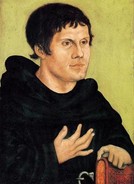What does it mean to be a Protestant? These are five of the major teachings of the reformers by which they distinguished their beliefs from those of the Roman Catholic church of their day. I affirm all five of these beliefs because I think they reflect the Bible’s teaching:
 1. Sola Scriptura – “The Bible alone.” Scripture alone speaks authoritatively, and it speaks to all believers, independently of church leaders and councils, human interpreters and so-called spokesmen for God.
1. Sola Scriptura – “The Bible alone.” Scripture alone speaks authoritatively, and it speaks to all believers, independently of church leaders and councils, human interpreters and so-called spokesmen for God.
2. Sola Gratia – “Grace alone.” It is only by the unmerited favor of God that Christ went to the cross and paid the price for man’s salvation. Man is by nature depraved—he has no virtue that commends him to God. Therefore God’s grace to him is truly undeserved and amazing, and God’s grace alone has the power to draw people to himself.
3. Sola Fide – “Faith alone.” Only total righteousness is acceptable to God, and that is found in Christ, not us. Man can only accept Christ’s work by placing his trust in him. Man is justified by faith alone in the finished work of Christ, not by any works of his own.
4. Sola Christus – “Christ alone.” Salvation is accomplished by Christ alone, and mediated by Christ alone—not by angels, saints, relics, sacraments, priests, teachers, churches, or anyone or anything else. Christ alone was the perfect Savior, and he alone is the perfect prophet, priest and king.
5. Soli Deo Gloria – “To God alone be glory.” God should be thanked, praised and given full credit for his sovereign grace and spiritual and physical provision. Theology should be God-centered, not man-centered. God should be put in his place and humans in theirs. Our efforts should not elevate and celebrate men but God. We should bring him glory in our work, in our homes and at play. He, not we, should be the center of all things.
For more resources, see http://www.monergism.com/directory/link_category/Five-Solas/

www.facebook.com/randyalcorn
www.twitter.com/randyalcorn
www.epm.org/blog
www.epm.org/
No comments:
Post a Comment